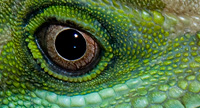Chinese water dragons need to be monitored closely for indicators of serious medical infections. The good news is your pet can be treated successfully if you point out the infection at an early stage. Even if you are a good owner, your pet should see a vet every year. Routine checkups ensure that your pet stays healthy and happy.
Your pet can get in contact with parasites and infections in its enclosure. Some parasite infections can spread rapidly leading to weight loss and bloody stool. If your dragon shows loss of appetite accompanied with caked or runny stool, it is likely that your pet suffers from gastrointestinal disease. You should immediately see a vet as over the counter drugs are not useful in this case.
Some dragon owners get worried after they see their pet moving around with a swollen snout. Bumps, bruise and abrasions develop when your dragon repeatedly bangs its snout on the glass walls. This is commonly seen if the enclosure is too small for your pet. You should make suitable changes in your dragon’s habitat to avoid nose rubs in the future.
Your dragon is likely to acquire respiratory infections if you don’t maintain the ideal heat requirements. Water dragons remain inactive and suffer from runny nose if the temperature falls too low. You can see clear or mucus like fluid dripping continuously from your dragon’s mouth and snout. Cold conditions don’t allow the dragons to breathe normally. Your pet may sit with its mouth wide open to ease breathing.
 Respiratory infections may also produce signs like wheezing and loss of appetite. If the infection gets serious, your pet will need antibiotics to get rid of the disease completely.
Respiratory infections may also produce signs like wheezing and loss of appetite. If the infection gets serious, your pet will need antibiotics to get rid of the disease completely.
You should also contact a specialized reptile vet if you notice paralysis or faulty movements of limbs and tail. These signals are one of the prominent indicators of metabolic bone disease. If this condition is left untreated, it can even kill your pet due to severe physical deformity and soft bones.
If you need help to keep your dragon in good health, you should never forget to take your dragon to a vet the moment you notice any unusual signs. Apart from the physical signs, sick dragons also show behavioral changes to tell you about their illness. If you want to be a good owner, you should not wait for long and save your pet before it gets late.









